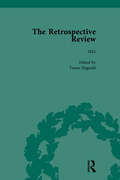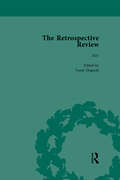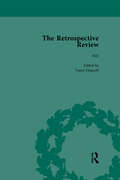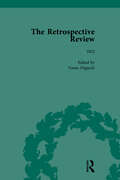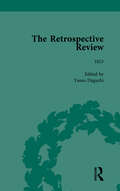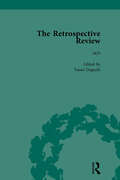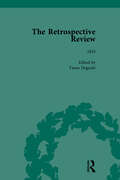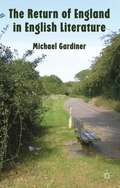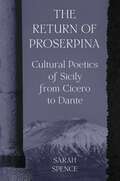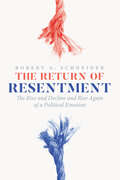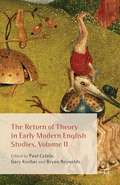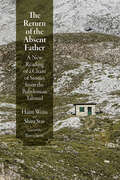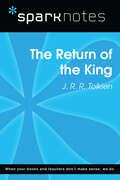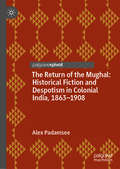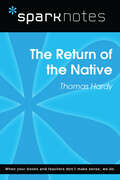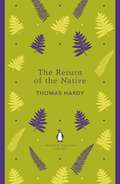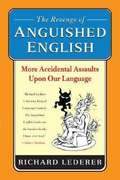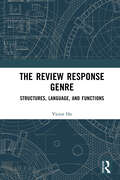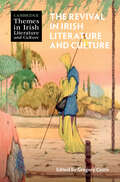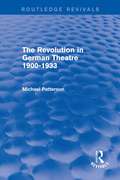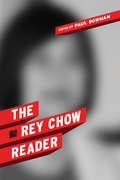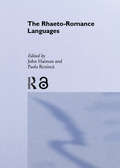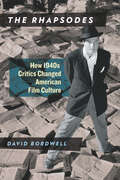- Table View
- List View
The Retrospective Review Vol 3
by Yasuo DeguchiFounded in 1820 by Henry Southern, "The Retrospective Review" aimed to recall the public from an exclusive attention to new books, by making the merit of old ones the subject of critical discussion. This edition reproduces in facsimile all 18 volumes of the periodical published between 1820-1854.
The Retrospective Review Vol 4
by Yasuo DeguchiFounded in 1820 by Henry Southern, "The Retrospective Review" aimed to recall the public from an exclusive attention to new books, by making the merit of old ones the subject of critical discussion. This edition reproduces in facsimile all 18 volumes of the periodical published between 1820-1854.
The Retrospective Review Vol 5
by Yasuo DeguchiFounded in 1820 by Henry Southern, "The Retrospective Review" aimed to recall the public from an exclusive attention to new books, by making the merit of old ones the subject of critical discussion. This edition reproduces in facsimile all 18 volumes of the periodical published between 1820-1854.
The Retrospective Review Vol 6
by Yasuo DeguchiFounded in 1820 by Henry Southern, "The Retrospective Review" aimed to recall the public from an exclusive attention to new books, by making the merit of old ones the subject of critical discussion. This edition reproduces in facsimile all 18 volumes of the periodical published between 1820-1854.
The Retrospective Review Vol 7
by Yasuo DeguchiFounded in 1820 by Henry Southern, "The Retrospective Review" aimed to recall the public from an exclusive attention to new books, by making the merit of old ones the subject of critical discussion. This edition reproduces in facsimile all 18 volumes of the periodical published between 1820-1854.
The Retrospective Review Vol 8
by Yasuo DeguchiFounded in 1820 by Henry Southern, "The Retrospective Review" aimed to recall the public from an exclusive attention to new books, by making the merit of old ones the subject of critical discussion. This edition reproduces in facsimile all 18 volumes of the periodical published between 1820-1854.
The Retrospective Review Vol 9
by Yasuo DeguchiFounded in 1820 by Henry Southern, "The Retrospective Review" aimed to recall the public from an exclusive attention to new books, by making the merit of old ones the subject of critical discussion. This edition reproduces in facsimile all 18 volumes of the periodical published between 1820-1854.
The Return of England in English Literature
by Michael GardinerThis lively study provides an account of the 'fall and rise' of the English nation within the British discipline of English Literature between the late eighteenth century and the present day, offering a reconceptualisation of the relationship between English Literature and the formation of English cultural identity.
The Return of Proserpina: Cultural Poetics of Sicily from Cicero to Dante
by Sarah SpenceSicily and the strategies of empire in the poetic imagination of classical and medieval EuropeIn the first century BC, Cicero praised Sicily as Rome’s first overseas province and confirmed it as the mythic location for the abduction of Proserpina, known to the Greeks as Persephone, by the god of the underworld. The Return of Proserpina takes readers from Roman antiquity to the late Middle Ages to explore how the Mediterranean island offered authors a setting for forces resistant to empire and a location for displaying and reclaiming what has been destroyed.Using the myth of Proserpina as a through line, Sarah Spence charts the relationship Western empire held with its myths and its own past. She takes an in-depth, panoramic look at a diverse range of texts set on Sicily, demonstrating how the myth of Proserpina enables a discussion of empire in terms of balance, loss, and negotiation. Providing new readings of authors as separated in time and culture as Vergil, Claudian, and Dante, Spence shows how the shape of Proserpina’s tale and perceptions of the island change from a myth of loss to one of redemption, with the volcanic Mt. Etna playing an increasingly central role.Delving into the ways that myth and geography affect politics and poetics, The Return of Proserpina explores the power of language and the written word during a period of tremendous cultural turbulence.
The Return of Resentment: The Rise and Decline and Rise Again of a Political Emotion (The Life of Ideas)
by Robert A. SchneiderCharts the long history of resentment, from its emergence to its establishment as the word of the moment. The term “resentment,” often casually paired with words like “hatred,” “rage,” and “fear,” has dominated US news analysis since November 2016. Despite its increased use, this word seems to defy easy categorization. Does “resentment” describe many interlocking sentiments, or is it just another way of saying “anger”? Does it suggest an irrational grievance, as opposed to a legitimate callout of injustice? Does it imply political leanings, or is it nonpartisan by nature? In The Return of Resentment, Robert A. Schneider explores these questions and more, moving from eighteenth-century Britain to the aftermath of the French Revolution to social movements throughout the twentieth century. Drawing on a wide range of writers, thinkers, and historical experiences, Schneider illustrates how resentment has morphed across time, coming to express a collective sentiment felt by people and movements across the political spectrum. In this history, we discover resentment’s modernity and its ambiguity—how it can be used to dismiss legitimate critique and explain away violence, but also convey a moral stance that demands recognition. Schneider anatomizes the many ways resentment has been used to label present-day movements, from followers of Trump and supporters of Brexit to radical Islamicists and proponents of identity politics. Addressing our contemporary political situation in a novel way, The Return of Resentment challenges us to think critically about the roles different emotions play in politics.
The Return of Resentment: The Rise and Decline and Rise Again of a Political Emotion (The Life of Ideas)
by Robert A. SchneiderCharts the long history of resentment, from its emergence to its establishment as the word of the moment. The term “resentment,” often casually paired with words like “hatred,” “rage,” and “fear,” has dominated US news analysis since November 2016. Despite its increased use, this word seems to defy easy categorization. Does “resentment” describe many interlocking sentiments, or is it just another way of saying “anger”? Does it suggest an irrational grievance, as opposed to a legitimate callout of injustice? Does it imply political leanings, or is it nonpartisan by nature? In The Return of Resentment, Robert A. Schneider explores these questions and more, moving from eighteenth-century Britain to the aftermath of the French Revolution to social movements throughout the twentieth century. Drawing on a wide range of writers, thinkers, and historical experiences, Schneider illustrates how resentment has morphed across time, coming to express a collective sentiment felt by people and movements across the political spectrum. In this history, we discover resentment’s modernity and its ambiguity—how it can be used to dismiss legitimate critique and explain away violence, but also convey a moral stance that demands recognition. Schneider anatomizes the many ways resentment has been used to label present-day movements, from followers of Trump and supporters of Brexit to radical Islamicists and proponents of identity politics. Addressing our contemporary political situation in a novel way, The Return of Resentment challenges us to think critically about the roles different emotions play in politics.
The Return of Theory in Early Modern English Studies, Volume II
by Paul Cefalu Gary Kuchar Bryan ReynoldsThis companion volume to The Return of Theory in Early Modern English Studies: Tarrying with the Subjunctive exemplifies the new directions in which the field is going as well as the value of crossing disciplinary boundaries within and beyond the humanities. Topics studied include posthumanism, ecological studies, and historical phenomenology.
The Return of the Absent Father: A New Reading of a Chain of Stories from the Babylonian Talmud (Divinations: Rereading Late Ancient Religion)
by Haim Weiss Shira StavThe Return of the Absent Father offers a new reading of a chain of seven stories from tractate Ketubot in the Babylonian Talmud, in which sages abandon their homes, wives, and families and go away to the study house for long periods. Earlier interpretations have emphasized the tension between conjugal and scholarly desire as the key driving force in these stories. Haim Weiss and Shira Stav here reveal an additional layer of meaning to the father figure's role within the family structure. By shifting the spotlight from the couple to the drama of the father's relationship with his sons and daughters, they present a more complex tension between mundane domesticity and the sphere of spiritual learning represented by the study house.This coauthored book presents a dialogic encounter between Weiss, a scholar of rabbinic literature, and Stav, a scholar of modern Hebrew literary studies. Working together, they have produced a book resonant in its melding of the scholarly norms of rabbinics with a literary interpretation based in feminist and psychoanalytic theory.
The Return of the King (SparkNotes Literature Guide Series)
by SparkNotesThe Return of the King (SparkNotes Literature Guide) by J.R.R. Tolkien Making the reading experience fun! Created by Harvard students for students everywhere, SparkNotes is a new breed of study guide: smarter, better, faster. Geared to what today's students need to know, SparkNotes provides: *Chapter-by-chapter analysis *Explanations of key themes, motifs, and symbols *A review quiz and essay topicsLively and accessible, these guides are perfect for late-night studying and writing papers
The Return of the Mughal: Historical Fiction and Despotism in Colonial India, 1863–1908
by Alex PadamseeThis Pivot explores the uses of the Mughal past in the historical fiction of colonial India. Through detailed reconsiderations of canonical works by Rudyard Kipling, Flora Annie Steel and Romesh Chunder Dutt, the author argues for a more complex and integral understanding of the part played by the Mughal imaginary in colonial and early Indian nationalist projections of sovereignty. Evoking the rich historical and transnational contexts of these literary narratives, the study demonstrates the ways in which, at successive moments of crisis and contestation in the later Raj, the British Indian state continued to be troubled by its early and profound investments in models of despotism first located by colonial administrators in the figure of the Mughal emperor. At the heart of these political fictions lay the issue of territoriality and the founding problem of a British claim to sole proprietorship of Indian land – a form of Orientalist exceptionalism that at once underpinned and could never fully be integrated with the colonial rule of law. Alongside its recovery of a wealth of popular and often overlooked colonial historiography, The Return of the Mughal emphasises the relevance of theories of political theology – from Carl Schmitt and Ernst Kantorowicz to Talal Asad and Giorgio Agamben – to our understanding of the fictional and jurisprudential histories of colonialism. This study aims to show just how closely the pageantry and romance of empire in India connects to its early politics of terror and even today continues to inform the figure of the Mughal in the sectarian politics of Hindu Nationalism.
The Return of the Native (SparkNotes Literature Guide Series)
by SparkNotesThe Return of the Native (SparkNotes Literature Guide) by Thomas Hardy Making the reading experience fun! Created by Harvard students for students everywhere, SparkNotes is a new breed of study guide: smarter, better, faster. Geared to what today's students need to know, SparkNotes provides: *Chapter-by-chapter analysis *Explanations of key themes, motifs, and symbols *A review quiz and essay topicsLively and accessible, these guides are perfect for late-night studying and writing papers
The Return of the Native (The Penguin English Library)
by Thomas Hardy'Do I desire unreasonably much in wanting what is called life - music, poetry, passion, war, and all the beating and pulsing that is going on in the great arteries of the world?'Tempestuous Eustacia Vye passes her days dreaming of passionate love and the escape it may bring from the small community of Egdon Heath. Hearing that Clym Yeobright is to return from Paris, she sets her heart on marrying him, believing that through him she can leave rural life and find fulfilment elsewhere. But she is to be disappointed, for Clym has dreams of his own, and they have little in common with Eustacia's. Their unhappy marriage causes havoc in the lives of those close to them, in particular Damon Wildeve, Eustacia's former lover, Clym's mother and his cousin Thomasin. The Retun of the Native illustrates the tragic potential of romantic illusion and how its protagonists fail to recognize their opportunities to control their own destinies.The Penguin English Library - 100 editions of the best fiction in English, from the eighteenth century and the very first novels to the beginning of the First World War.
The Revenge of Anguished English: More Accidental Assaults upon Our Language
by Richard LedererAn anguished language expert provides the latest collection of unfortunate typos, tragically misplaced modifiers, and other hilarious language snafus.
The Review Response Genre: Structures, Language, and Functions
by Victor HoExpanding the scope of the metadiscourse construct, Ho offers a comprehensive analysis of the online review response genre using hotel managers' responses to negative reviews posted by dissatisfied customers on TripAdvisor. He adopts a robust research methodology that involves both quantitative and qualitative analyses of three different types of data: managerial responses to negative comments, questionnaire responses from dissatisfied customers who wrote the reviews, and interview responses from hotel managers who wrote the responses. By drawing upon the genre theory and the construct of rapport and metadiscourse, the analysis shows that hotel management’s attempts at service recovery can be materialized through the move structures of the managerial responses, and the strategies used in managing rapport with dissatisfied customers and in persuading both existing and potential customers to purchase accommodation services from the hotels. An essential reading for students and researchers of pragmatics and professional communication, along with anyone interested in the role of language in persuading customers, neutralizing criticisms, and managing interpersonal relationships, particularly in the context of open forums online.
The Revival in Irish Literature and Culture (Cambridge Themes in Irish Literature and Culture)
by Gregory CastleThe Revival in Irish Literature and Culture offers a wide variety of new work on the Revival and the ideals, attitudes and perspectives that animate it, from the late-nineteenth century to the present day. The contributors to the volume, each in their own fashion, explore the social, political and cultural expressions of revivalism in literature but also in film, music, dance, commemorations, museum exhibits, social movements, and political activism. The volume offers new perspectives on established figures and ideas as well as new research on forgotten or under-represented revivalists, particularly women, whose cultural and political activities were instrumental in forming the foundations of the Revival and whose ongoing involvement shapes revivalism in new social and cultural contexts. One of the most important thematic strands linking the chapters is the function of time-our understanding of the historical “sense of the past” but also the efficacy of new temporal frameworks.
The Revival of Antique Philosophy in the Renaissance
by John L. LepageThis book examines the revival of antique philosophy in the Renaissance as a literary preoccupation informed by wit. Humanists were more inspired by the fictionalized characters of certain wise fools, including Diogenes the Cynic, Socrates, Aesop, Democritus, and Heraclitus, than by codified systems of thought. Rich in detail, this study offers a systematic treatment of wide-ranging Renaissance imagery and metaphors and presents a detailed iconography of certain classical philosophers. Ultimately, the problems of Renaissance humanism are revealed to reflect the concerns of humanists in the twenty-first century.
The Revolution in German Theatre 1900-1933 (Routledge Revivals)
by Michael PattersonFirst published in 1981, this book represents the first work in English to give a comprehensive account of the revolutionary developments in German theatre from the decline of Naturalism through the Expressionist upheaval to the political theatre of Piscator and Brecht. Early productions of Kaiser’s From Morning till Midnight and Toller’s Transfiguration are presented as examples of Expressionism. A thorough analysis of Piscator’s Hoppla, Such is Life! And Brecht’s Man show the similarities and differences in political theatre. In addition, elements of stage-craft are examined — illustrated with tabulated information, an extensive chronology, and photographs and designs of productions.
The Rey Chow Reader
by Rey ChowRey Chow is arguably one of the most prominent intellectuals working in the humanities today. Characteristically confronting both entrenched and emergent issues in the interlocking fields of literature, film and visual studies, sexuality and gender, postcolonialism, ethnicity, and cross-cultural politics, her works produce surprising connections among divergent topics at the same time as they compel us to think through the ethical and political ramifications of our academic, epistemic, and cultural practices. This anthology - the first to collect key moments in Chow's engaging thought - provides readers with an ideal introduction to some of her most forceful theoretical explorations. Organized into two sections, each of which begins with a brief statement designed to establish linkages among various discursive fields through Chow's writings, the anthology also contains an extensive Editor's Introduction, which situates Chow's work in the context of contemporary critical debates. For all those pursuing transnational cultural theory and cultural studies, this book is an essential resource.
The Rhaeto-Romance Languages (Romance Linguistics)
by John Haiman Paola BenincaThe Rhaeto-Romance languages have been known as such to the linguistic community since the pioneering studies of Ascoli and Gartner over a century ago. There has never been a community of RR speakers based on a common history or polity and the various dialects are mutually unintelligible, but a unity, based on a number of common features, has been advanced. This book is the first general description of the Rhaeto-Romance languages to be written in English. It provides a critical examination of the phonology, morphology, lexicon, and syntax of the modern Rhaeto-Romance dialects within the broader perspective of Romance comparative linguistics.
The Rhapsodes: How 1940s Critics Changed American Film Culture
by David BordwellPauline Kael, Andrew Sarris, and Roger Ebert were three of America's most revered and widely read film critics, more famous than many of the movies they wrote about. But their remarkable contributions to the burgeoning American film criticism of the 1960s and beyond were deeply influenced by four earlier critics: Otis Ferguson, James Agee, Manny Farber, and Parker Tyler. Throughout the 1930s and '40s, Ferguson, Agee, Farber, and Tyler scrutinized what was on the screen with an intensity not previously seen in popular reviewing. Although largely ignored by the arts media of the day, they honed the sort of serious discussion of films that would be made popular decades later by Kael, Sarris, Ebert and their contemporaries. With The Rhapsodes, renowned film scholar and critic David Bordwell--an heir to both those legacies--restores to a wider audience the work of Ferguson, Agee, Farber, and Tyler, critics he calls the "Rhapsodes" for the passionate and deliberately offbeat nature of their vernacular prose. Each broke with prevailing currents in criticism in order to find new ways to talk about the popular films that contemporaries often saw at best as trivial, at worst as a betrayal of art. Ferguson saw in Hollywood an engaging, adroit mode of popular storytelling. Agee sought in cinema the lyrical epiphanies found in romantic poetry. Farber, trained as a painter, brought a pictorial intelligence to bear on film. A surrealist, Tyler treated classic Hollywood as a collective hallucination that invited both audience and critic to find moments of subversive pleasure. With his customary clarity and brio, Bordwell takes readers through the relevant cultural and critical landscape and considers the critics' writing styles, their conceptions of films, and their quarrels. He concludes by examining the profound impact of Ferguson, Agee, Farber, and Tyler on later generations of film writers. The Rhapsodes allows readers to rediscover these remarkable critics who broke with convention to capture what they found moving, artful, or disappointing in classic Hollywood cinema and explores their robust--and continuing--influence.
